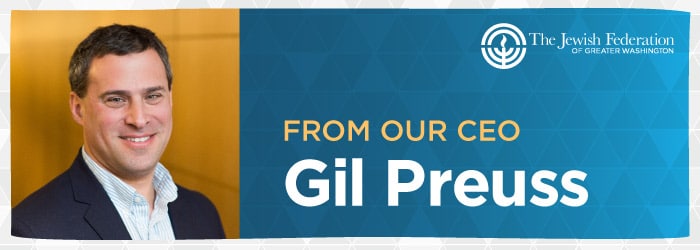-
06 September 2018

In a few days, we will have the opportunity to celebrate the start of a new year and once again reflect on the many ways we can narrow the gap between our actions and our values. Indeed, the High Holidays are a time to consider who we are and who we want to be. It is our chance to revisit what drives us—as individuals and as a community.
Here at The Jewish Federation of Greater Washington, we are driven by our commitment to create a vibrant Jewish community that is open and where people can find connections of meaning and purpose.
Importantly, we are driven to create a community that cares for each other.
We believe that the direction of our community is defined by how we treat one another. When we treat each other with dignity and respect in all of our interactions, we lay the groundwork for real and lasting bonds. Moreover, when we go out of our way to care for one another, we ensure a strong and resilient future.
As I approach the coming year and reflect on my own aspirations, I find myself asking: what does a caring community look like? What steps can I take to contribute to this vision? What are the ways, big and small, seen and unseen, through which we express our care?
I am proud to say that here in Greater Washington, kindness abounds. Take, for example, the work of Sunflower Bakery. They help young adults with learning differences gain the skills and experience they need for employment in baking and other related industries.
At JSSA (the Jewish Social Service Agency), team members provide health, financial, and other crucial services to people in need, including hundreds of Holocaust survivors. And in synagogues across the area, members of chesed (kindness) committees are volunteering their time and energy to ensure families receive support during moments of both joy and hardship.
These are but a few of the many ways individuals are taking it upon themselves, their associations, and their organizations to care for others. Whether through charitable giving, community service, personal relationships, or other activities, members of our community are finding ways to transform the lives of those whom they know and those whom they have never met.
But caring is not a static condition. It is not a passive goal. Instead, a caring community is one that requires the ongoing and active participation of all its members. As Mr. Rogers (let’s call him an honorary Jewish sage) once said, “Love isn’t a state of perfect caring, it is an active noun like struggle.”
Caring is not one act or another—instead, caring is the sum total of acts large and small, personal and institutional, that creates an invaluable sense of connection and shared fate.
At The Jewish Federation, we are committed to partnering with organizations that form an infrastructure of a caring community. While organizations help to shape the contours of our community, it is the way we treat each other, however, that brings the picture of who we are into focus. This is the culture of a caring community. It is up to each of us to reach out to new neighbors, to lend a hand, to communicate warmth, and to demonstrate understanding. Ultimately, it is the everyday interactions that we share that will determine our wellbeing.
Just as we must renew our intentions to be better people year after year, so we must commit again and again to strengthen and perpetuate the kind of community we all envision.
I hope that this year, we each take the opportunity to do what we can to bring our ideals to life. Let us think of caring not as an end state but as an ongoing practice, one that defines us and our community for generations to come.
Wishing you a sweet and healthy new year,
Gil
